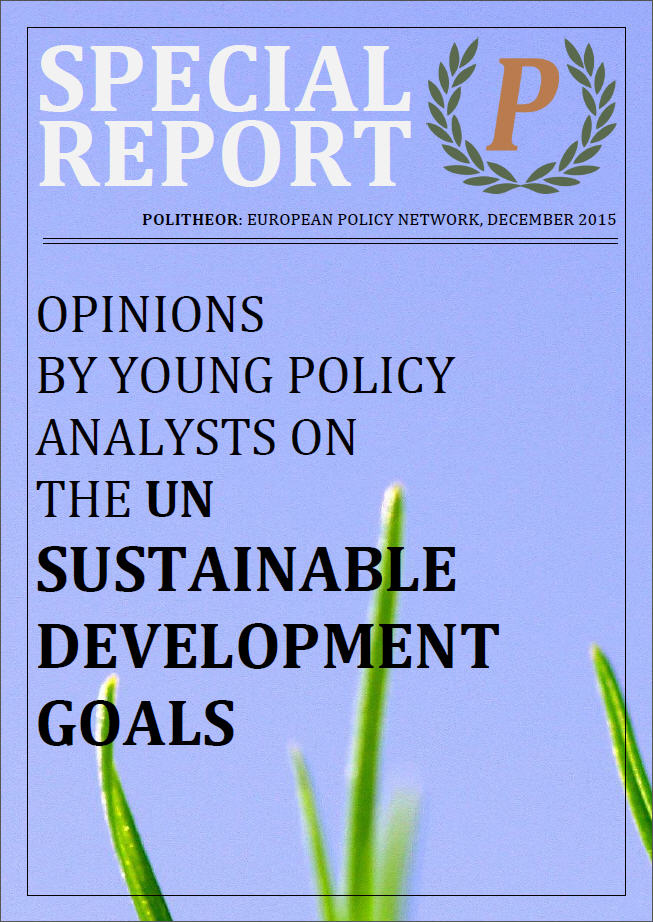Not least because sustainability has become a catch-all phrase, much ink has been spilled about the UN SDGs.
Editor: Mathis Hampel
Authors: Ahmad Shariq (Azerbaijan), Ays Sirakaya (Belgium), Beatrice Mumbi (Kenya), Jaap Rozema (The Netherlands), Jonathan Volt (Denmark), Justine Chauvin (Switzerland), Lea Duplan (Germany), Rustam Issakhojayev (Hungary)
Download Link: http://www.politheor.net/wp-content/uploads/2015/12/Politheor-Special-Report-on-the-UN-SDGs.pdf
Serving as reference goals for the international development community for the period 2015-2030, on 19 July 2014 the Sustainable Development Goals (SDGs) were proposed by the United Nations General Assembly in New York. The difference in wording – Sustainable Development Goals replace the Millennium Development Goals (MDGs) – reflects the ever growing importance societies place on sustainability, which – like all interesting words – defies easy definition.
Not least because sustainability has become a catch-all phrase, much ink has been spilled about the UN SDGs. Commentary alternates between praise, critique and cynicism. While UN and government officials hail their brainchild, and critics take issue with what they identify as conservatism – SDGs aim to save the world without transforming it; they sustain systematic inequalities – others again have compared the Goals to a high school wish list to save the world.
In this special edition, students and young policy scholars take issue with the SDGs. Far from a critique of, let alone comprehensive guide to the SDGs, this collection of op-eds shows their engagement with Goals which are likely to shape the global development agenda for the next fifteen years. Their op-eds are bringing to life what an audit culture is eager to press into league tables and performance targets so as to objectively measure development. Because the 17 goals and their 169 targets mean different things to different people in different places, they also defy easy measurement.
This special edition is not a comprehensive guide to the SDGs – if that is at all possible. Nor do we offer a radical critique. The SDGs are a lens of hope through which our policy analysts address the many inequalities vexing humanity. Whether that hope reminds you of a high-school wish list to save the world does not matter. Such ‘critique’ also misses the point. The discussion should not concern the arithmetic feasibility of these Goals, but how we are to attain them, recognizing interlinkages and synergies as we go; not the Sustainable Development Goals but the Sustainable Development Pathways (SDPs) should be up for debate. If in 2030, whilst formally having reached many of the 169 targets, grave inequalities between and within societies remain, we cannot speak of success!
9 comments













9 Comments
SteveP
15/12/2015, 9:33 amAmazing work! 🙂
REPLYModern slavery in the Irish fishing industry: a labor or migration question? | Politheor
16/12/2015, 3:38 pm[…] Politheor’s Special Report on the UN SDGs Special Report […]
REPLYThe hidden power of open government data in the EU | Politheor
17/12/2015, 11:26 am[…] > Read Politheor’s special report on the SDGs here […]
REPLYWomen in Afghanistan: a story of hope and despair | Politheor
18/12/2015, 4:42 pm[…] the Millennium Development Goals’ (MDGs) contribution to their advancement were notable, the Sustainable Development Goals (SDGs) are expected to preserve and further enhance […]
REPLYWhat does the internet mean? | Politheor
19/12/2015, 2:07 pm[…] United Nations’ (UN) 2030 Agenda for Sustainable Development declares seeking “to bridge the digital divide”, including as its 9th goal the aim to “[…] […]
REPLY